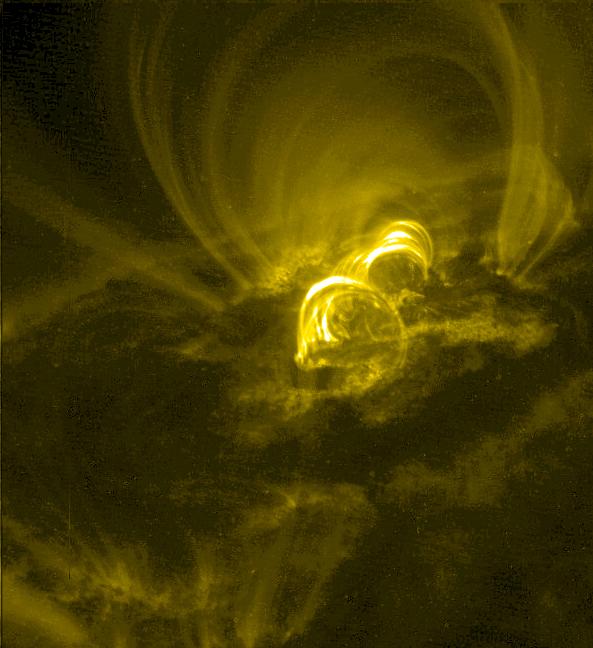
Cambridge, MA
The U.S. could be in for quite a show tonight! Astronomers are predicting that the Northern Lights will shine on and off, periodically coating the northern sky in brilliant greens and reds.
"This evening, there is about a 70 percent chance of medium-strength aurorae at our Boston latitude," says Smithsonian astronomer Jonathan Cirtain of the Harvard-Smithsonian Center for Astrophysics (CfA). "Aurorae could reach even further south."
To see the Northern Lights, Cirtain recommends getting away from city lights. "The darker your sky, the better. Then, all you have to do is look north. No telescope is necessary. The best way to see an aurora is to use your eyes alone."
Aurorae occur during geomagnetic storms, which are triggered by eruptions on the Sun. "A geomagnetic storm is already in progress," says Cirtain. "It will last at least through tonight."
Several flares already have come from a large active region on the Sun's surface. This area of complex magnetic fields and seething energy has produced several X-class flares, which are the most energetic variety. The National Oceanic and Atmospheric Administration (NOAA) predicts a 75% chance of additional X-class flares within the next 24 hours.
Cirtain, who works with the Transition Region and Coronal Explorer (TRACE) satellite, has produced movies of the recent flares. "In one case, we recorded 5 separate flares over the course of 6 hours. That's very unusual."
As the sunspot region generating the flares continues to rotate across the Sun's surface and face the Earth head-on, the chance that we will be affected grows because more material from future eruptions will reach us.
"We're going to be under the gun for at least the next 3 to 8 days," says Cirtain. "As long as this active region keeps producing flares, we're going to keep getting hit."
Headquartered in Cambridge, Mass., the Harvard-Smithsonian Center for Astrophysics (CfA) is a joint collaboration between the Smithsonian Astrophysical Observatory and the Harvard College Observatory. CfA scientists, organized into six research divisions, study the origin, evolution and ultimate fate of the universe.
David A. Aguilar
Director of Public Affairs
Harvard-Smithsonian Center for Astrophysics
617-495-7462
daguilar@cfa.harvard.edu
Christine PulliamPublic Affairs Specialist
Harvard-Smithsonian Center for Astrophysics
617-495-7463
cpulliam@cfa.harvard.edu